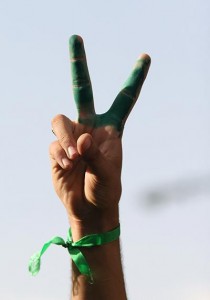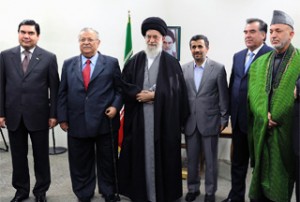The Latest from Iran (30 March): Strategies
 Tuesday, March 30, 2010 at 21:01
Tuesday, March 30, 2010 at 21:01  2000 GMT: Politics, Religion, and Culture. Reihaneh Mazaheri in Mianeh offers a detailed article setting out how President Ahmadinejad has tried to use financial support of religious and cultural centres, often supervised by his close allies, to reinforce his political base. An extract:
2000 GMT: Politics, Religion, and Culture. Reihaneh Mazaheri in Mianeh offers a detailed article setting out how President Ahmadinejad has tried to use financial support of religious and cultural centres, often supervised by his close allies, to reinforce his political base. An extract:The administration of President Mahmoud Ahmadinejad is using state funds to spread its political and religious ideology and at the same time maintain powerful allies during times of turmoil, critics say.
The authorities have set aside 4.5 billion of the 347 billion US dollar, 2010-11 budget, which took effect on March 21, for cultural matters - but much of it is spent on religious and culturally hardline institutions sympathetic to the administration.
Ever since first becoming president in 2005, Ahmadinejad has made a clear effort to defend religious groups and organisations to a degree previously unknown in the country.
He set out his thinking in a speech to clergy in southern Fars province in 2007, saying, “In the budget of previous administrations, no room was found for religious centres and religious matters. However, we have taken them into consideration in the budget.”
The budget for “mosque centres”, one of the government’s main sources of popular support, has increased to 25 million dollars from 1.6 million in 2005 at the end of the term of reformist president Mohammad Khatami, according to Mohammad Hosseini, the minister of culture and Islamic guidance.
NEW Iran: Preventing Tehran from “Going Nuclear” (Ramazani)
NEW Iran Politics and Music: Sasi Mankan’s “Karroubi”
NEW Iran: The Green Movement’s Next Steps (Shahryar)
Iran: A View from the Labour Front (Rahnema)
Iran’s Nukes: False Alarm Journalism (Sick)
The Latest from Iran (29 March): Questionable Authority
1545 GMT: A Media Note. To the Charlie Rose Show on the US Public Broadcasting Service: I've now viewed what amounted to a half-hour propaganda special for the Iranian regime, aired in the US last night. Given the substitution of polemic, distortions, and misrepresentations posing as "analysis", I'm not even posting a link.
I'm hoping that this unfortunate interview disappears quickly. However, if it receives any attention as supposed "insight" into post-election Iran, I will be back with a fury.
In the meantime, this should suffice: this programme is a disservice and, indeed, a disgrace given the thousands detained, abused, and denied rights and freedoms. Speak to them, not the two "experts" to whom you turned over airtime last evening.
1540 GMT: Today's Propaganda Drama. After the reported rescue of Iranian diplomat Heshmatollah Attarzadeh Niaki from abductors in Pakistan, the Iranian Ministry of Intelligence has declared, “The Islamic Republic did not capitulate to any of this armed group’s demands which is supported by the US and Mossad.”
1535 GMT: Grounding Iran's Airliine. The European Commission has imposed a ban on flights by Iran Air within Europe.
1530 GMT: The "Other" Khamenei Visits Freed Reformist. Hadi Khamenei, the brother of Ayatollah Ali Khamenei, joined others in visiting Mostafa Tajzadeh, the former Deputy Minister of Interior who is on temporary release for Nowruz, at his house last night.
1520 GMT: Revival of the Photograph. Pedestrian reports that Amir Sadeqi of the photo blog Tehran Live is out of prison and again taking and posting his photographs.
1500 GMT: Another Death Sentence. Back from an academic break and an appearance on Al Jazeera English's Inside Story (airing 1730 GMT) about the latest in Iraq's power politics, I find confirmation on websites of the news --- reported yesterday --- that 42-year-old schoolteacher Abdolreza Ghanbari has been sentenced to death for "Mohareb (war against God) through contacts with dissident groups". This broad charge covers "suspicious emails and having contacts with television media outside the country".
1110 GMT: Joke of the Day. An EA correspondent has pointed out the feature from the blog Persian Letters on post-election humour in Iran but, in my opinion, the best joke came from a reader in the comments:
Q. How Many Basijis Does It Take To Change A Lightbulb?
A. None. The Basijis will sit in the dark and blame Israel and the USA.
0810 GMT: Latest on the battle over subsidy reform comes from "principlist" member of Parliament Mohammad Hossein Farhangi, who says the Government is obliged to act according to the vote of the Majlis.
0800 GMT: Rule of Law. Rah-e-Sabz tries to interpret what a meeting between the Supreme Leader and the head of Iran's judiciary, Sadegh Larijani, means for Iran's judicial procedure and sentencing.
Rah-e-Sabz also claims information on a strategy by the Revolutionary Guards to avoid exposure of human rights violations, including the effort to crack down on human rights organisations in Iran.
0655 GMT: Political Prisoner Watch. Children's rights activist Maryam Zia Mohaved has reportedly been released from Evin Prison after a 13-day hunger strike.
0645 GMT: We begin today with three Iran specials. Josh Shahryar thinks about the next steps for the Green Movement. R.K. Ramazani evaluates the best US strategy to deal with Iran's nuclear programme. And, after the arrest of underground rap artist Sasi Mankan, we post his April 2009 single "Karroubi".
 Abdolreza Ghanbari,
Abdolreza Ghanbari,  Amir Sadeqi,
Amir Sadeqi,  Ayatollah Ali Khamenei,
Ayatollah Ali Khamenei,  Charlie Rose Show,
Charlie Rose Show,  European Commission,
European Commission,  Hadi Khamenei,
Hadi Khamenei,  Heshmatollah Attarzadeh Niaki,
Heshmatollah Attarzadeh Niaki,  Iran,
Iran,  Iran Air,
Iran Air,  Iran Elections 2009,
Iran Elections 2009,  Islamic Revolution Guards Corps,
Islamic Revolution Guards Corps,  Josh Shahryar,
Josh Shahryar,  Maryam Zia Mohaved,
Maryam Zia Mohaved,  Mehdi Karroubi,
Mehdi Karroubi,  Mianeh,
Mianeh,  Mohammad Hossein Farhangi,
Mohammad Hossein Farhangi,  Mohammad Hosseini,
Mohammad Hosseini,  Mohammad Khatami,
Mohammad Khatami,  Mohammad Sadegh Larijani,
Mohammad Sadegh Larijani,  Mossad,
Mossad,  Mostafa Tajzadeh,
Mostafa Tajzadeh,  Pakistan,
Pakistan,  Pedestrian,
Pedestrian,  Persian Letters,
Persian Letters,  Public Broadcasting Service,
Public Broadcasting Service,  R.K. Ramazani,
R.K. Ramazani,  Rah-e-Sabz,
Rah-e-Sabz,  Reihaneh Mazaheri,
Reihaneh Mazaheri,  Sasi Mankan,
Sasi Mankan,  Tehran Live in
Tehran Live in  Middle East & Iran
Middle East & Iran 


